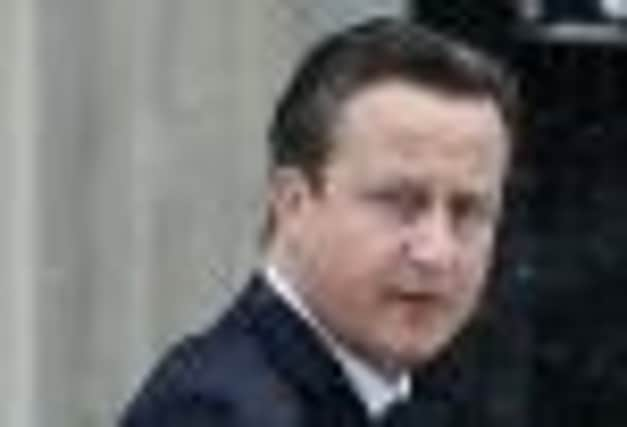David Cameron could back EU exit if Britain doesn’t get better deal


In his long-awaited speech on Europe yesterday, Mr Cameron promised to hold an in/out referendum based on a renegotiated settlement by 2017 if he is still Prime Minister after the next general election.
Although he insisted the UK should stay in the EU on renegotiated terms, he refused to say whether he would back the UK’s membership if he failed to get a new settlement.
Advertisement
Hide AdAdvertisement
Hide AdDuring Prime Minister’s Questions, Labour leader Ed Miliband asked Mr Cameron four times to clarify whether he would vote for the UK to stay in the EU even if did not get a new deal. Mr Cameron refused to answer.
European governments were quick to caution Mr Cameron after his speech yesterday, saying he was playing “a very dangerous game”.
Guido Westerwelle, Germany’s foreign minister, said: “Britain should not seek further derogations within the EU. Not everything needs to be regulated in Brussels, but a policy of cherry-picking will not work.”
French foreign minister Laurent Fabius said the Prime Minister was behaving like a football player who suddenly announces he wants to play rugby.
Spain’s foreign minister said: “I think the British have played a very dangerous game by feeding euroscepticism.”
Guy Verhofstadt, former Belgian prime minister and Liberal Democrat leader in the European Parliament, warned against trying “hold the EU to ransom”.
Mr Miliband also said yesterday that his party was opposed to a referendum.
In his speech, Mr Cameron argued the mandate for membership of the EU for the UK was “wafer thin”, comparing the need for a referendum with the need for an Scottish independence referendum.
Advertisement
Hide AdAdvertisement
Hide AdThe Prime Minister said he wanted a new treaty to reform the EU for all its members, but was ready to demand a renegotiated status for Britain alone if other nations did not agree.
Draft legislation will be drawn up by the Conservative Party ahead of the election, and will be enacted by the end of 2015 if the Tories win, to pave the way for renegotiation and a referendum within the following two years, he said.
“It is time for the British people to have their say,” Mr Cameron said. “It is time to settle this European question in British politics.”
Mr Cameron said it would be more difficult to rebuild the economy if Britain was facing years of uncertainty over its status in Europe.
Conservative Party eurosceptics, including former defence secretary Liam Fox and Bill Cash, welcomed the speech.
Leading Tory figures also called on the party to now start talking about different issues.
The party’s leading donor and former treasurer, Lord Ashcroft, said: “It is time for Tory eurosceptics to declare victory and talk about something else.”
The speech, which has been six months in the planning and was postponed from last week because of the Algerian hostage crisis, comes amid growing Tory backbench concern about the rising tide of support for the UK Independence Party (Ukip), rated at 10 per cent in polls.
Advertisement
Hide AdAdvertisement
Hide AdUkip leader Nigel Farage said that yesterday’s speech marked a victory for his party. He said: “The genie is out of the bottle”.
Mr Farage went on: “While Ukip regards this speech as its greatest achievement to date, the real work for our party has only just begun.”
Mr Cameron warned voters their decision in a referendum will be “an important choice to make about our country’s destiny” and cautioned against opting for exit without thinking through the consequences.
“I understand the appeal of going it alone, of charting our own course,” he said. “But it will be a decision we will have to take with cool heads. Proponents of both sides will need to avoid exaggerating their claims.
“The question we will have to ask ourselves is this: is that the best future for our country?”
Simon Walker, head of the Institute of Directors, said: “The Prime Minister’s approach is realistic and pragmatic.”
TUC general-secretary Frances O’Grady said: “The Prime Minister’s call for a possible referendum in four years is a distraction, creating uncertainty for business investment.”